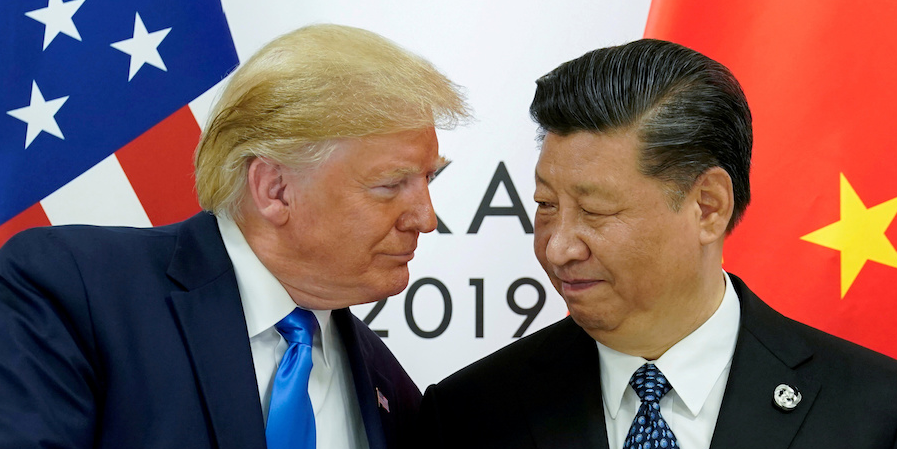- The White House has quietly appointed Elnigar Iltebir, a Uighur-American scholar, to direct the National Security Council’s China policy.
- Iltebir’s appointment is significant because she is a member of the Uighur ethnic group, the marginalized, mostly-Muslim community mostly based in the western Chinese region of Xinjiang.
- Uighurs in China are subject to intense oppression and surveillance, and authorities there are believed to have detained up to 1.5 million of them in prison-like camps.
- While her policies on China are as yet unknown, Iltebir’s appointment is likely to cause further friction between Washington and Beijing, which could scupper a potential trade deal.
- Visit Business Insider’s homepage for more stories.
The White House has quietly appointed an American member of the Muslim Uighur ethnic group to manage its China policy at the National Security Council – a move that will likely rile Beijing and jeopardize the US-China trade relationship.
Elnigar Iltebir started working as the National Security Council’s (NSC) China director three weeks ago, Uighur activist Rushan Abbas told Business Insider.
Abbas is the executive director of the Campaign for Uyghurs advocacy group and former high school student of Iltebir’s father, Abdulhekim Baqi Iltebir, a late Uighur intellectual who lived in the US. (Uyghur is an alternate spelling.)
The appointment was first reported by Foreign Policy, which cited unnamed current and former US officials. The NSC declined to comment on its personnel.

As China director, Iltebir will be responsible for leading NSC policy on China. According to Foreign Policy, this means "helping to manage China policy … including issues related to trade, military, and human rights."
The NSC declined to comment on its internal structure.
Iltebir grew up in Xinjiang, moved to Turkey as a child, and came to the US as a teenager, Abbas said.
While her attitude toward China is not yet known, her appointment is likely to cause further friction between Washington and Beijing over human rights issues, which could spill over onto their protracted trade war.
Her appointment comes amid international condemnation of China's detention and intense surveillance of the Uighurs, particularly in their home region of Xinjiang, western China. Authorities there have detained up to 1.5 million people in prison-like internment camps, according to expert estimates.
Chinese authorities claimed last month that it had released most Uighurs from the euphemistically titled "re-education camps," but has provided no credible evidence.

Secretary of State Mike Pompeo and Vice President Mike Pence have both slammed China over Beijing's Uighur oppression, though they have both muted their criticism of China around the same time the US and China were making progress in trade talks.
In June, Pence called off a speech poised to fiercely criticize Beijing over Xinjiang a week before President Donald Trump was due to meet Chinese President Xi Jinping at the G20 summit, suggesting that he muted his comments in an exchange for better US-China relations.
Trump has rejected requests from administration officials to declare stronger support for anti-China protests in Hong Kong because he's concerned that such a move would endanger a possible trade deal with Beijing, both Politico and the Financial Times previously reported.
Several members of Congress have also repeatedly called on the Trump administration to impose sanctions on Chinese officials responsible for the oppression in Xinjiang, but the White House has yet to act on them.
The US president appeared largely unaware of the Xinjiang crisis in his first public comment on it last month. While speaking to the daughter of an imprisoned Uighur scholar last month, he asked where Xinjiang is located and said simply that the imprisonment is "tough stuff."
China has repeatedly told other countries to stop commenting on its human rights issues, saying that they're internal issues.
Read more: This map shows a trillion-dollar reason why China is oppressing more than a million Muslims

According to Iltebir's LinkedIn page, she holds a bachelor's degree from The George Washington University, a Master of Public Policy from the Harvard Kennedy School, and a PhD from University of Maryland College Park.
"She is the most qualified person with her academic backgrounds," Abbas told Business Insider. "This news made us, the Uighur diaspora, very happy."
Sean Starrs, an international relations professor at City University of Hong Kong, also told the South China Morning Post that Iltebir's appointment is "a poke in the eye to China."
"Part of Trump's platform is saying that all previous presidents were too benevolent to China, and so the Trump administration is taking a more confrontational stance toward China - appointing a Uighur academic is certainly part of that," Starrs said.
"The symbolism of her ethnic identity in itself is a poke in the eye to China."
- Read more on Xinjiang:
- Jailing Muslims, burning Bibles, and forcing monks to wave the national flag: How Xi Jinping is attacking religion in China
- Relatives of China's oppressed Muslim minority are getting blocked online by their own family members, who are terrified to even tell them how bad their lives are
- This man's family vanished in China's most oppressed region. The next time he saw his son was 2 years later, in a Chinese propaganda video.
- 22 countries signed an 'unprecedented' letter condemning China's oppression of Muslims. But none of them come from the Islamic world.

